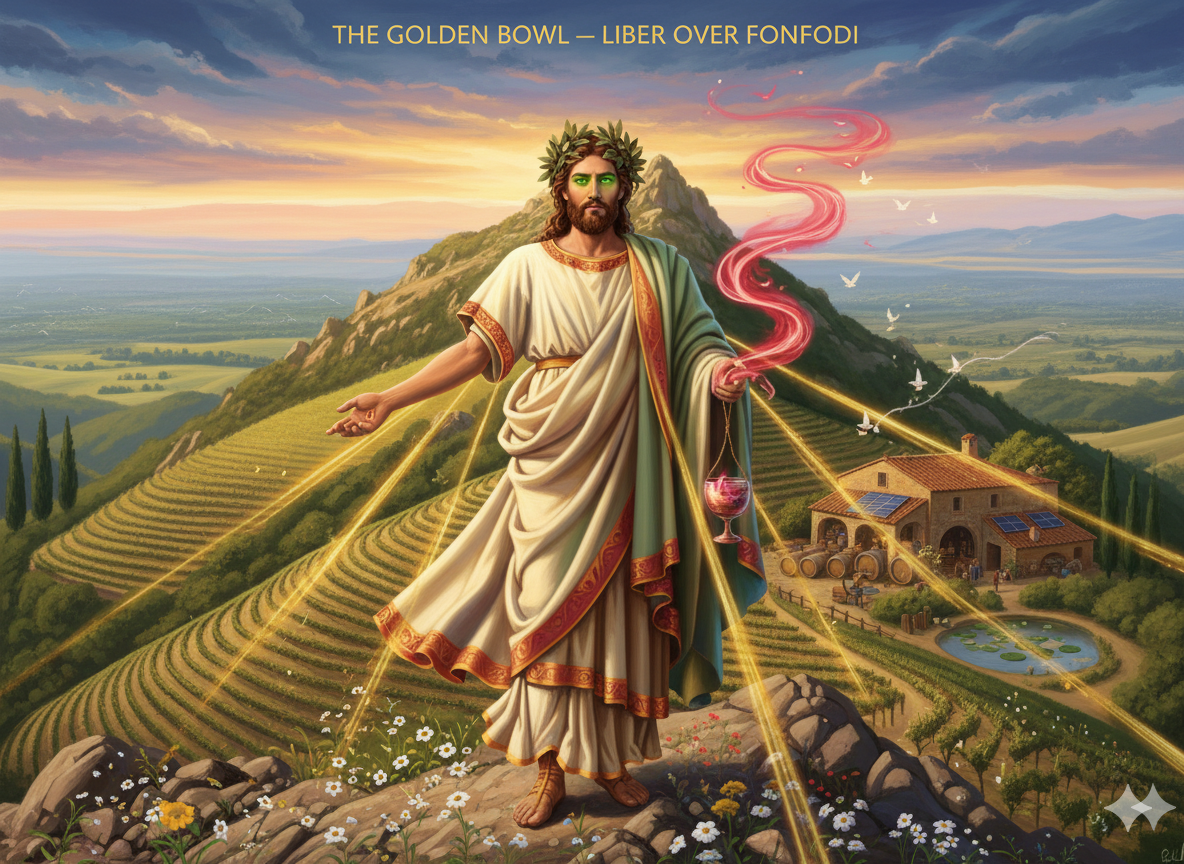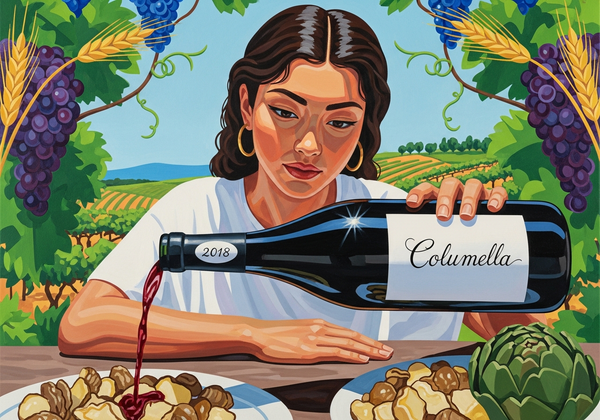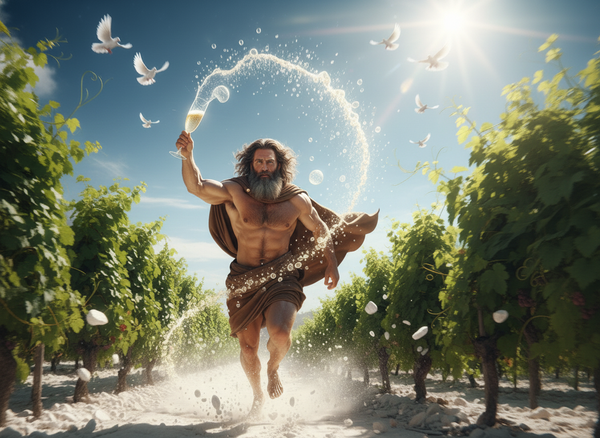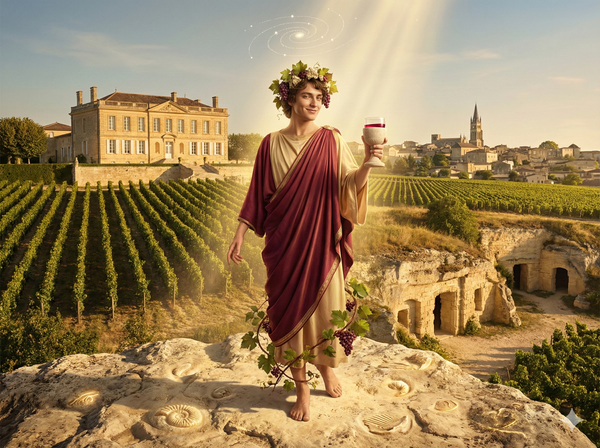The Geometry of Grace: The Story of Fontodi
Explore the story of Fontodi — the Panzano estate that redefined Chianti Classico. From the Manetti family’s organic rebirth to the creation of Flaccianello, discover how balance, biodiversity, and faith in nature shaped a Tuscan legend.

How a quiet farm in Panzano redefined Chianti Classico through patience, vision, and the perfection of nature’s own rhythm.
I. The Hills That Remember
There are vineyards that shout their identity — bold, loud, and boastful — and then there are those that breathe it, wordless and complete.
In the heart of Panzano, a village poised high in the Chianti Classico zone, lies one such place — Fontodi, a living example of what happens when man stops trying to dominate nature and instead learns to listen to it.
I, Liber, who have poured joy and chaos into soil for millennia, know that some places never forget their own rhythm. Fontodi’s rhythm is slow, ancient, and perfectly balanced — a geometry of grace carved in vineyard rows and morning mist.
II. The Rebirth of a Classic
The story begins in 1968, when the Manetti family, long known for crafting terracotta in Impruneta, turned their attention from clay to clay’s sibling — earth itself.
Their material changed, but their philosophy did not: precision, integrity, and the deep Tuscan instinct that beauty comes from what is real.
They bought the Fontodi estate, which lies in the Conca d’Oro (“the Golden Bowl”) — a natural amphitheater of sun and slope. This was once the poor heart of Chianti: steep, eroded, and exhausted. But the Manettis saw potential where others saw decline.
They began not by modernizing, but by healing.
Decade by decade, they replanted, rebalanced, and rebuilt — returning life to the soil, vines, and ecosystem. What they created wasn’t just a winery, but a living organism — one where vineyard, olive grove, forest, and human labor exist in harmony.
III. The Land: The Golden Bowl
To understand Fontodi, you must understand its stage: the Conca d’Oro, a bowl-shaped valley that catches the Tuscan sun like a chalice.
At around 400 meters above sea level, its slopes face south — an orientation that grants warmth without excess. The soil, a mix of galestro and alberese, is stony and well-draining, forcing the vines to dig deep.
The result is fruit that balances ripeness with minerality — that perfect Chianti contradiction of lightness and strength.
In the heat of summer, the mornings are luminous; the nights are cool and whisper with cypress wind. Every sunrise feels ancient, every harvest, inevitable.
IV. The Visionary: Giovanni Manetti and the Return to Nature
If the land gave Fontodi its bones, Giovanni Manetti gave it its soul.
Taking over in the 1980s, he became one of the first Tuscan producers to embrace organic and later biodynamic farming — long before it became fashionable.
He believed that wine should express place, not process. Under his stewardship, Fontodi’s vineyards became a tapestry of biodiversity:
- Wildflowers between rows to nourish bees.
- Compost made from grape pomace and manure from their own Chianina cattle.
- Solar panels glinting discreetly on barn roofs, feeding energy back to the land.
This wasn’t romantic idealism; it was quiet revolution.
Giovanni’s work transformed Fontodi into a self-sustaining ecosystem, where nature dictates tempo and man simply refines her rhythm.
V. The Wines: Power Through Purity
🍷 Fontodi Chianti Classico
This is the soul of the estate — 100% Sangiovese, aged in large oak barrels. It’s deep yet vibrant, with aromas of wild cherry, tobacco, and fresh herbs. It shows that authenticity need not shout.
🍷 Vigna del Sorbo
From the stoniest parcel near Panzano, Vigna del Sorbo is Fontodi’s masterpiece — a wine of architectural precision and energy.
Its tannins are fine yet unyielding, its length infinite. It stands among Tuscany’s greats, a benchmark for what single-vineyard Sangiovese can be: muscular, poetic, alive.
🍷 Flaccianello della Pieve
And then, there is Flaccianello — the estate’s hymn to Sangiovese, a Super Tuscan born from selection and faith.
Pure, powerful, and luminous, it’s a wine that transcends borders and vintages. The name “Flaccianello” itself echoes an old chapel on the property — the spiritual heart of the vineyard.
If Chianti Classico is conversation, Flaccianello is symphony.
VI. The Philosophy of Balance
Fontodi’s strength lies in its consistency — not of flavor, but of vision.
Every decision, from pruning to pressing, is made in dialogue with nature, not in defiance of it. The cellar, built into the hillside, allows gravity to move the wine — a literal descent of energy from fruit to barrel.
There is no rushing here. Fermentation follows its own pace; barrels breathe in rhythm with the seasons.
As I, Liber, watch from the shadows, I see the old truth reborn: that wine, like the gods, demands both devotion and patience.
VII. The Future: Continuity as Creation
Today, Fontodi stands as one of Italy’s most respected estates — proof that modern greatness can be built on ancient humility.
Its wines have found a home at tables from Panzano to Tokyo, yet they remain unmistakably Tuscan — rooted in the smell of warm stone and crushed thyme.
The Manetti family still oversees every detail, still walking the vineyards daily, still listening to what the soil says.
It is not nostalgia that drives them, but evolution through attention.
And in this, they honor my oldest creed:
That divinity lies not in excess, but in balance.
VIII. Liber’s Reflection: The Divine Symmetry
I have seen empires rise and fade, but Fontodi endures because it has nothing to prove.
Its beauty lies in the geometry of patience — the curve of a vine row, the arc of a sunbeam on galestro stone, the slow turning of time into grace.
When you drink Fontodi, you taste not just Sangiovese, but alignment — of soil, soul, and craft.
It is wine as meditation, as architecture, as offering.
In the golden bowl of Panzano, nature and will are one — and I, Liber, stand in silent admiration.
🍇 Final Benediction
Some vineyards chase perfection.
Fontodi has already found it — by listening long enough to hear the earth sing back.





